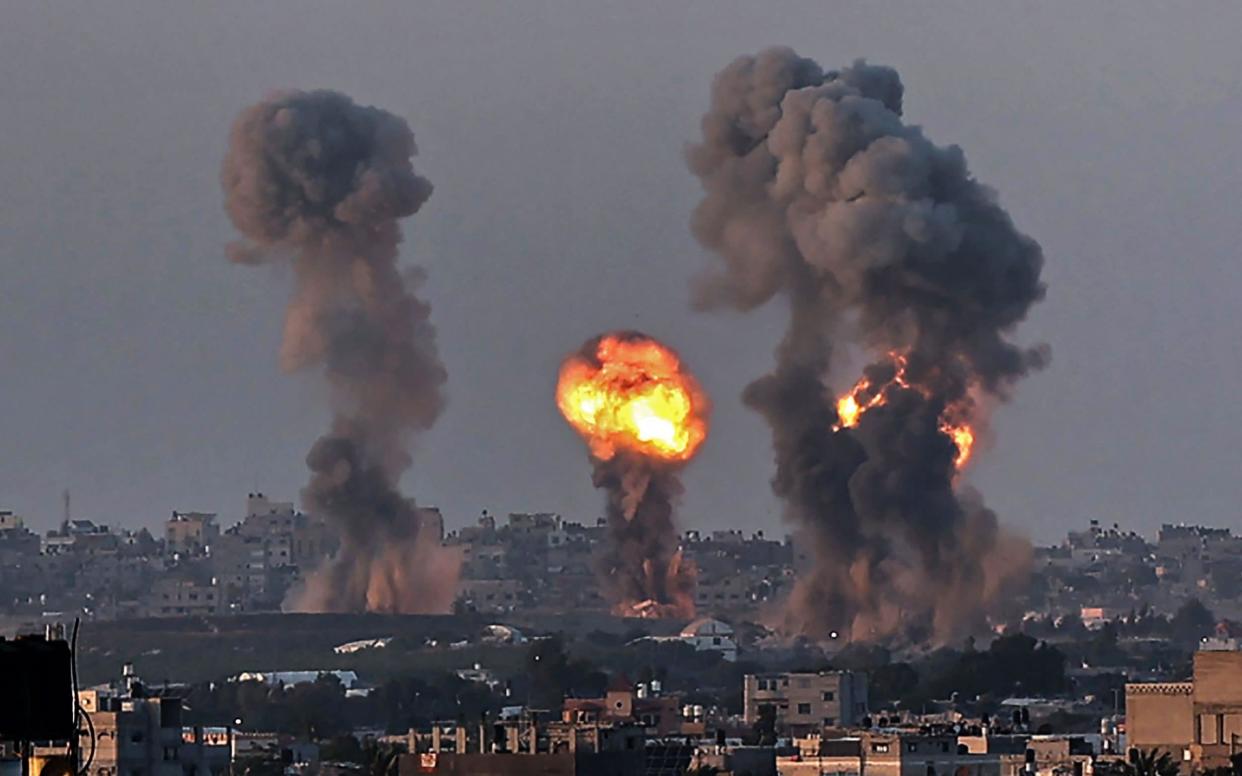Israeli-Palestinian conflict: what is behind the violence in Gaza and Jerusalem?

What sparked the latest conflict between Israel and Gaza?
For weeks, Palestinian protesters and Israeli police have clashed daily in Jerusalem, with a series of incidents during the Muslim holy month of Ramadan contributing to the mounting hostilities between Israelis and Palestinians.
Last month extreme right right Israelis marched through East Jerusalem chanting “Death to Arabs” amid tensions over Ramadan restrictions and videos online showing Palestinian attacks on Jews.
The looming eviction of Palestinian families from the Sheikh Jarrah neighbourhood in East Jerusalem to make room for Israeli settlers has further inflamed anger. Israel describes it as a property dispute but critics describe it as state-sponsored ethnic cleansing.
On Wednesday the minister for the Middle East James Cleverly said “We urge Israel to cease such actions, which in most cases are contrary to international humanitarian law.”
Clashes around the al-Aqsa mosque compound have seen Israeli police firing rubber bullets, tear gas and stun grenades inside what is the third holiest site in Islam. The compound is also home to the Dome of the Rock and the site of the biblical Jewish temple, of which only the Western Wall remains.
Control over Jerusalem in general and the holy hilltop compound in particular are an especially emotive issue for many Jews and Palestinians.
What has happened so far?
Since Monday Hamas and other Palestinian militant groups in the Gaza Strip have fired over 1,000 rockets towards Israel, targeting civilian centres including Tel Aviv and Beer Sheva.
Israel’s Iron Dome missile defence system has intercepted most of the rockets but at least 20 have struck home, killing several people, wounding more and damaging buildings, cars and other infrastructure.
Israel has responded with hundreds of air strikes on Gaza, a densely populated and built up coastal strip in which the militants have embedded themselves within civilian populations.
Israel on Thursday night appeared to declare a start to an anticipated offensive on the occupied Gaza Strip as Hamas continued to bombard the Jewish state with rocket fire.
“IDF air and ground troops are currently attacking in the Gaza Strip,” the Israeli Defence Forces (IDF) said in a brief message, signalling the most serious escalation since the 2014 war.
Footage appeared to show dozens of rockets raining down on the Palestinian enclave, however, the Israeli army later clarified that its troops had not entered the Gaza Strip as it had earlier stated, blaming an "internal communication" problem for the confusion.
So far 65 people have been reported killed in Gaza and seven in Israel, including one soldier.
Will the conflict get worse?
The United Nations envoy for Middle East Peace, Tor Wennesland, warned on Wednesday the two sides are heading "towards a full-scale war".
As the death toll grows, reining in the conflict will become more difficult and on the ground rhetoric by some Israeli and Palestinian leaders has reflected the high levels of communal animosity.
In an unusually strong statement, Israeli President Reuven Rivlin on Wednesday denounced "bloodthirsty Arab mobs" after rioting by Arab-Israelis spread across Israel.
There have been calls for calm but little sign that the international community is willing to intervene in the conflict. On Wednesday the UK said the recent escalation was “deeply concerning” and “the worst violence seen there in several years”.
“As the Prime Minister and Foreign Secretary have made clear, this cycle of violence must stop and every effort must be made to avoid the loss of life, especially that of children,” Mr Cleverly said.
Key Israeli ally the United States has thrown its weight behind Israel, with President Joe Biden condemning the rocket attacks and pledging his "unwavering support for Israel's security and Israel's legitimate right to defend itself, while protecting civilians."
The UN Security Council will hold a virtual public meeting on Sunday to address the soaring violence between Israel and the Palestinians, diplomats said on Thursday.
What could happen next?
Israel on Thursday said it was massing troops along the Gaza frontier and calling up 9,000 reservists ahead of a possible ground invasion of the Hamas-ruled territory, as the two bitter enemies plunged closer to all-out war. Egyptian mediators rushed to Israel for cease-fire efforts but showed no signs of progress.
Israeli residents living within three miles of the border with Gaza had been told by the military to head to their shelters.
It came after Hamas fired a long-range rocket towards Eilat, Israel's main tourist resort, on Thursday, which Israeli media reports said was the furthest distance a Hamas rocket had ever travelled.
The Israeli military ended 38 years of occupation in Gaza in 2005, at which point the militant Islamist group Hamas was elected to run the enclave. Periods of increased hostilities saw Israeli troops re-enter Gaza in early 2009 during Operation "Cast Lead" and during “Operation Protective Edge” in 2014.
Those operations suggest that another ground invasion could produce high casualties, with the preponderance on the Palestinian side. During the 50 days of fighting in 2014, the United Nations recorded the deaths of 2,205 Palestinians, including at least 1,483 civilians, and 71 Israelis, including 66 soldiers.

